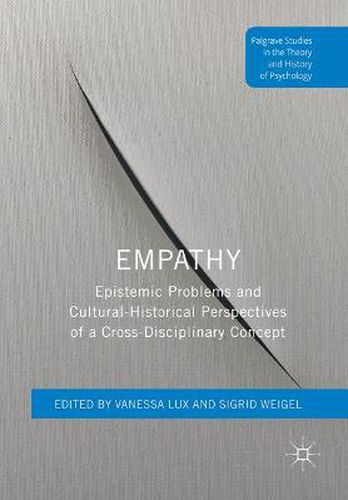Readings Newsletter
Become a Readings Member to make your shopping experience even easier.
Sign in or sign up for free!
You’re not far away from qualifying for FREE standard shipping within Australia
You’ve qualified for FREE standard shipping within Australia
The cart is loading…






This title is printed to order. This book may have been self-published. If so, we cannot guarantee the quality of the content. In the main most books will have gone through the editing process however some may not. We therefore suggest that you be aware of this before ordering this book. If in doubt check either the author or publisher’s details as we are unable to accept any returns unless they are faulty. Please contact us if you have any questions.
This book digs into the complex archaeology of empathy illuminating controversies, epistemic problems and unanswered questions encapsulated within its cross-disciplinary history. The authors ask how a neutral innate capacity to directly understand the actions and feelings of others becomes charged with emotion and moral values associated with altruism or caregiving. They explore how the discovery of the mirror neuron system and its interpretation as the neurobiological basis of empathy has stimulated such an enormous body of research and how in a number of these studies, the moral values and social attitudes underlying empathy in human perception and action are conceptualized as universal traits. It is argued that in the humanities the historical, cultural and scientific genealogies of empathy and its forerunners, such as Einfuhlung, have been shown to depend on historical preconditions, cultural procedures, and symbolic systems of production. The multiple semantics of empathy and related concepts are discussed in the context of their cultural and historical foundations, raising questions about these cross-disciplinary constellations. This volume will be of interest to scholars of psychology, art history, cultural research, history of science, literary studies, neuroscience, philosophy and psychoanalysis.
$9.00 standard shipping within Australia
FREE standard shipping within Australia for orders over $100.00
Express & International shipping calculated at checkout
This title is printed to order. This book may have been self-published. If so, we cannot guarantee the quality of the content. In the main most books will have gone through the editing process however some may not. We therefore suggest that you be aware of this before ordering this book. If in doubt check either the author or publisher’s details as we are unable to accept any returns unless they are faulty. Please contact us if you have any questions.
This book digs into the complex archaeology of empathy illuminating controversies, epistemic problems and unanswered questions encapsulated within its cross-disciplinary history. The authors ask how a neutral innate capacity to directly understand the actions and feelings of others becomes charged with emotion and moral values associated with altruism or caregiving. They explore how the discovery of the mirror neuron system and its interpretation as the neurobiological basis of empathy has stimulated such an enormous body of research and how in a number of these studies, the moral values and social attitudes underlying empathy in human perception and action are conceptualized as universal traits. It is argued that in the humanities the historical, cultural and scientific genealogies of empathy and its forerunners, such as Einfuhlung, have been shown to depend on historical preconditions, cultural procedures, and symbolic systems of production. The multiple semantics of empathy and related concepts are discussed in the context of their cultural and historical foundations, raising questions about these cross-disciplinary constellations. This volume will be of interest to scholars of psychology, art history, cultural research, history of science, literary studies, neuroscience, philosophy and psychoanalysis.